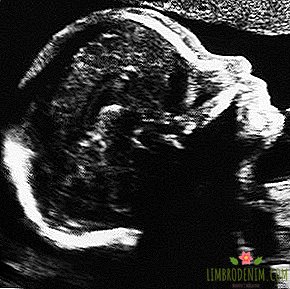"Mad Journey": How I Bore Prematurely
As one therapist told me, "pregnancy is a crazy journey into the unknown." Now, when I have my own and a thousand foreign stories heard in the ancestral sections, I agree with him. Yes, pregnancy is like a Russian roulette. I know those who successfully delivered at home in the bathroom or said that it is worse to go to the dentist. I also know those who for months lay on conservation, experienced miscarriages and clinical death. In my lottery ticket it was meant to give birth two months ahead of schedule.

My pregnancy was not perfect, but I liked it. A little indisposition in the first trimester, but an unprecedented increase in strength in the second. The doctor in the antenatal clinic is always friendly and contented. I was not sick, I took the prescribed vitamins and tried to walk more often. Toward the third trimester, the fear of childbirth intervened in my euphoria, and I enrolled in a school for pregnant women. At one of the classes, they said that every fourth of us would give birth with a cesarean section. I did not take it seriously: the health is excellent, my birth will be natural, like my mother. The main thing is how to tune.
When the 31st week of my pregnancy was going on, I sat in the chat room of the school of cultural journalism, where I entered as a free listener. I waited for the discussion of my work and suddenly I felt that the stomach had become very hard, and the shocks of the child were more tangible. It seemed to me abnormal - I called the doctor from the consultation, and she told me to call an ambulance or do an ultrasound at the nearest gynecologist. The situation did not look serious, so I chose the latter: just in case I put the documents I needed for admission to the hospital into a backpack and sat in a taxi.
The doctor listened to the complaints and habitually opened the blood pressure monitor, from which I did not expect anything bad. It turned out that the pressure was 170/120, although it was not felt at all. Examination in the chair, ultrasound, some kind of recording in the direction and the first injection of magnesia, which many pregnant women know: it effectively removes the tone of the uterus, and it feels like poison, which slowly paralyzes the entire leg. "The real fighter!" - Sister said, after I made no sound. I looked at the paper with the direction, and finally I was diagnosed: the threat of premature birth. Ambulance still needed.
I remembered that I had read in the weekly mailing list for pregnant women: "The baby has grown considerably, now his lungs are developing." It turns out that he is still not ready for birth - he has not gained enough weight, strength, and organs are still being formed. Can he even live if born? I have never heard of those who have given up prematurely, and had no idea whether this is bad. Everything was too unexpected and did not fit into my picture of "ideal" pregnancy and childbirth at all. The team arrived calmed me down: this is what everyone writes, it’s not worth crying, otherwise the pressure will rise.
We planned paid family births, but we still did not have time to conclude an agreement or even choose a maternity hospital - so I was taken to the nearest one. In the emergency room there was another injection of magnesia, since the pressure did not fall. I did not believe that something serious could happen to me: I was worried, frightened, doctors were being reinsured. Tomorrow let go home.
In the morning it turned out that I had pre-eclampsia. Nobody went into details: I read in Wikipedia that this is one of the most frequent causes of death for pregnant women in developed countries - after that I decided to read nothing more. Doctors are not the most talkative people in the world, so until the very end I had little idea what was happening to me. Understood only after discharge, after the conclusion about the state of the placenta, scratched from the maternity hospital, after conversations with a hematologist, general practitioners and gynecologists and self-reading.
Preeclampsia (formerly also called preeclampsia, or late toxicosis) is a complication of pregnancy, the main signs of which are edema and increased pressure. Its unequivocal cause has not been established: it is believed that genetics, vascular factors, and autoimmune processes play a role. As a result, the process is started, due to which the vessels spasm, and as a result the blood circulates poorly. Because of this, the mother suffers greatly from the kidneys, liver and brain, and oxygen and nutrients are worse supplied to the fetus, which leads to developmental delays and oxygen starvation. Preeclampsia can manifest itself very weakly, so that a pregnant woman will not notice her, but can shy away from convulsions, stroke, or placental abruption.

I was told not to worry and tune in to an ambulance, they put a dropper with magnesia. But after a couple of days, they began to make injections, which help the lungs of the child to ripen and open up faster. I had severe edema, and a protein appeared in my urine tests — an unkind sign. I was given a special sign in which it was necessary to record the amount of water consumed and the amount of urine. A catheter was placed in the arm, because there were a lot of droppers. I slept almost all the time, avoided conversations with my neighbors, read an interesting book and still believed that I would go out of town for the weekend, I perceived everything as annoying, but an adventure.
The maternity hospital was closed for airing, and the commission of doctors determined that I would be transported to another. In the emergency room, the litmus test measured protein in the urine. In terms of performance, I was given a wheelchair, which amused me, because I could easily walk by myself. In the new ward, a portable dropper was waiting for me, which I carried everywhere with me: it had to work 24 hours a day - magnesia, of course. The first night I woke up feeling that I was “boiling”, and the taste of iron appeared in my mouth. I panicked, pressed the call button sister. "This is magnesia! It happens! Sleep!" - the woman came told. I began to fear the dropper, the nurse's mistakes, it seemed to me that the medicine only harmed me and the child. From that moment I realized that everything was really bad, and the fear did not leave me.
The next day there were again tests, numerous ultrasounds and examinations. I tried to calm myself, I sang mantras out of despair, breathed deeply, tried to read. In the next bed, a young woman sang too, but she had contractions. Finally, the doctor came and explained that while the baby is receiving food through the placenta, but at any moment it may stop, so tomorrow I will have a scheduled operation. Husband and mother-in-law rushed - they did not believe that a cesarean section was necessary. A whole council of doctors gathered who, to my surprise, went to meet us and explained everything. In parallel, the anesthesiologist asked me questions to pick up anesthesia. I said that after diurnal magnesia, it became worse to see and navigate in space - she looked at me carefully and announced that the operation would be an emergency. I barely had time to say goodbye to my husband when I was rolled in a chair along a long corridor to the operating room.
I had no idea how the caesarean section was going on, and was completely unprepared to give birth right now. I didn’t know how to cope with fear, until in the intensive care unit Nastya, a very young intern, who smiled and joked with me, intercepted my gurney — everything seemed normal. I was pummeling, but the people around were calm and businesslike, friendly. The anesthesiologist introduced the drug and ordered to count to ten. I fell into a dream, it seemed to me that I was wandering through some mountains. I am still sure that I heard my newborn son scream and even saw the doctor holding him - for some reason, by the leg. This, of course, is impossible, since anesthesia was common. I was informed that the operation was successful, and the child was given 7 points out of 10 on the Apgar scale, which is actually a very decent result. According to this scale, all newborns are assessed: they look at skin color, pulse, muscle tone, respiration, reflexes and set this initial assessment. My son shouted himself, but then his lungs closed, and this greatly complicated the case - he was transferred to intensive care. He weighed 1900 grams. I could not realize this figure soon.
I was taken to the intensive care unit, where all mothers after a cesarean section go. I spent thirty-six hours there, lying on my back, attached to several droppers. Neighbors were brought and taken away, faces appeared above me: sisters, anesthesiologist, head of the maternity hospital. Some woman asked: "Can you tell your relatives that everything is alright? Why don't you answer the calls?" I wanted to be alone with myself, to understand what had happened, to define my attitude to this. He is there alone, in plastic and cold light, he is scared, lonely - I wanted to do at least something for him. I began to imagine how the angels fly around the incubator; then it became a little calmer, and I was able to talk.
On the second night, I was finally released to the postpartum department. Apparently, then I forgot to give a painkiller injection: it was deep night and my sister was in a hurry to release the bed. I could not get up, because the pain in the area of the seam was unbearable. My sister began to help, and I lost consciousness. Everyone knows the feeling when you wake up at home in your bed and you are relieved to understand that you just had a bad dream. It happened exactly the opposite to me. From the same colorful mountains I was drawn back into reality, and I realized with icy horror: I gave birth! Before the deadline! I need to get up! Without straining, I somehow sat down in a chair. When in the ward, without any ceremony, my sister put me on the bed, I turned off again, like Andrei Bolkonsky, who was brought to the field hospital after the battle.
In the morning I woke up in sticky horror and was afraid to move, so as not to feel pain. On the second bed, someone was sleeping, covered with a blanket with his head. Two empty iron cradles. The vigorous sister came and made a long-awaited injection of the anesthetic. I had to get up, because I wanted unbearably to the toilet; there was a ship in the chair, but I never wanted to use it in the presence of a stranger. I didn’t manage to let go of the wall and go to the toilet, so I apologized and got ready to faint - this was how our first conversation took place. I loved my neighbor; we exchanged stories, she had everything on the contrary: a long natural childbirth in three shifts of doctors, a large girl, now also in intensive care. I do not know what was the matter, but her presence gave me enormous strength. She became almost a sister to me, the closest person, those who understand better than anyone.

The husband brought a postoperative bandage, with which it became much easier, and took me to the floor above, to the children's intensive care unit - the son was already seen by everyone except me. I was afraid of the feelings I would experience when I saw him. Do I recognize him? Scared? He slept, seemed calm. Very small, with thin handles, inflated belly, in tiny woolen socks, similar to felt boots. I was allowed to push my hand through the round hole of the couvez. He immediately grabbed my finger tightly - a normal reflex, which seemed like a miracle. From that moment I became strong.
A day later, he was taken to a children's hospital. Later I saw how they do it: big, strong men quickly and confidently carry under jackets tiny rolls from the doors of the maternity hospital to a car with special equipment. Three days later, they finally discharged me — no flowers, balloons, or photographers. I begged my husband not to make me laugh, because laughter, like sneezing, brought acute pain. I walked to the car and immediately went to the children's hospital - it was the only one in the city where mothers could be around the clock. But they really didn’t allow to be really close to the child. They said by telephone: "If there is no milk, we do not need you here."
On the day there was one conversation with the doctor on duty. The information was the most general: here is the incubator, here we maintain the temperature and oxygen level, you had an infection of the amniotic fluid, therefore antibiotics. It was possible to approach the baby only during these conversations. The remaining eight times a day, when I brought milk, you could watch from afar. One night, when there was no boss, the nurse on duty disconnected my child from several tubes and handed it to me - this was the first time I held him in my arms. And with great effort she gave it back.
When my son learned to breathe himself, he was transferred to the intensive care unit. Now I was allowed to dress him, swaddle, weigh, give simple medicines and feed: first connect the syringe with milk to the tube that led directly into the esophagus, then try to get him to eat from the bottle. One day he was put into an open cradle without any wires or needles, and after some time I was able to take him to my ward. When the weight was firmly fixed on the figure of 2500 grams and the tests were good, we were discharged.
For the next two months, I pumped out the milk and weighed the baby endlessly before he could suck the breast himself. Fortunately, there were no pathologies: for the first year of his life, he had never been sick and quickly began to meet age standards. I constantly meet people who give birth or were born prematurely, and I myself often tell about my story.
Everything ended well, but left its mark. Now I am afraid of any medical manipulations, not only because of the pain that had to be transferred, but also because of the stories that had to be heard. With horror I think about second births, and sometimes I think it is better to adopt a child; while looking for a suitable psychotherapist. Only recently I came across a gynecologist who was able to give practical advice: to pass genetic tests for pre-eclampsia, on the basis of them to correct the course of pregnancy with enzymes and vitamins, because the probability of premature birth during the second pregnancy is even higher than the first.
I could not survive this story and remain myself if my relatives, friends, almost all medical personnel and other women did not support me. I was always afraid of hospitals and talking about them, but everything turned out to be much better than I imagined, the conditions of the hospital are very comfortable, doctors and sisters are competent. It's a mystery to me how they can remain human with such a schedule and low pay. I admire the pediatric intensive care physicians who nurture and rescue babies with extremely low body mass.
Premature birth is a story of a child and a mother. Not only is he alone, but also the mother. It is very difficult not to be near him, not to be able to help, not to feel guilty. It is difficult not to know what is happening now with the child and what will happen next, how to help him. It is difficult to live a month in the hospital, as if in a cell, without a family, a kettle and a normal bed. Such a beginning takes a lot of energy, and yet colic and lactostasis are ahead. Two years have passed, and I still do not feel that I have rested and accepted my story to the end. And I really hope that in the next ticket I will extend a calm natural childbirth.
PHOTO: Pineapples - stock.adobe.com (1, 2, 3)





